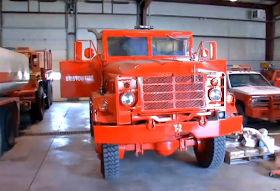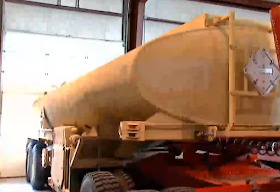FRIDAY, FEBRUARY 13, 2015
TULSA, OKLAHOMA
The chief of the Bristow Fire Department is in the hospital
with serious injuries, after an accident in the last place any firefighter
would expect to get hurt.
Chief David McSpadden was hurt when a truck he was working on at the fire station exploded on Tuesday, February 10, 2015.
"He's extremely lucky. As far as I'm concerned, somebody was really watching over him," said his son, Matt McSpadden.
Being the chief's son and a former firefighter himself, Matt, knows the risks and always knew a call saying something had happened to his dad could come at any time.
"You expect this stuff to happen on fires," Matt said. "You don't expect it happen in the station."
Chief McSpadden was working on a tanker truck Tuesday afternoon when the explosion happened. The 1984 former military truck was donated to the department about a year ago and firefighters have been trying to get it up and running ever since.
"He smelled battery acid, so he stepped up on the truck and as soon as he lifted the cowling to where the battery box is, it blew," said Captain Charles Conkling.
The State Fire Marshal's office says it's possible static electricity from batteries charging under the front seat ignited the blast.
"Yeah, it was heard pretty well all over town. It was pretty...pretty violent," said Capt. Conkling.
The chief was knocked off the three foot step and knocked unconscious. Two firefighters who were just outside rushed to help.
“When you are the incident, it kind of catches you off guard and especially when it's someone you know and care about, it makes it pretty tough,” Conkling said. “It's horrible because you feel helpless, you do what you can, but you still feel helpless.”
The blast broke Chief McSpadden's spine, damaged his eye socket and ear drum and severely cut his face.
He also broke his jaw, so he can't talk.
"We gave him a pad of paper and he writes down on there, 'First time in 30 years.' And we're like, 'What are you talking about?' And it's the first time in 30 years he's ever been hurt," said his son, Matt. "He says, 'I'm still here, I'll be fine.'"
Matt said even in a hospital bed, his dad is thinking about what needs to be done back at the fire department.
“He was actually wanting me to call the station this morning to tell Jeff to tell Chuck to get the payroll done, to take care of the guys, make sure they get paid on time,” Matt said.
The chief has made fighting fires and serving the community of Bristow his life's work.
“He's a super guy, the kind of guy that won't ask you to do nothing unless he'll do it too. He's a good leader, a good guy, a good boss,” Conkling said.
McSpadden has been with the fire department for nearly 31 years, he was named chief last July. The accident, his son says, will not be the final chapter of the chief's career.
“It's gonna be a road, but we'll make it,” Matt said. “I think he'll want to keep on trucking and I think he'll keep on trucking as long as he can.”
And until he's back on his feet, the chief's brothers at the fire house have things covered.
“We look for him to come back, that's what we look forward to. We'll keep up the slack until he get here,” Conkling said.
Firefighters said the fate of the tanker truck is unclear, they said considering what happened, using it makes them a little nervous.
The State Fire Marshal is still investigating the exact cause and should have a final report out soon.
Donations can be made to the David McSpadden Benefit fund at the Community Bank in Bristow.
Chief David McSpadden was hurt when a truck he was working on at the fire station exploded on Tuesday, February 10, 2015.
"He's extremely lucky. As far as I'm concerned, somebody was really watching over him," said his son, Matt McSpadden.
Being the chief's son and a former firefighter himself, Matt, knows the risks and always knew a call saying something had happened to his dad could come at any time.
"You expect this stuff to happen on fires," Matt said. "You don't expect it happen in the station."
Chief McSpadden was working on a tanker truck Tuesday afternoon when the explosion happened. The 1984 former military truck was donated to the department about a year ago and firefighters have been trying to get it up and running ever since.
"He smelled battery acid, so he stepped up on the truck and as soon as he lifted the cowling to where the battery box is, it blew," said Captain Charles Conkling.
The State Fire Marshal's office says it's possible static electricity from batteries charging under the front seat ignited the blast.
"Yeah, it was heard pretty well all over town. It was pretty...pretty violent," said Capt. Conkling.
The chief was knocked off the three foot step and knocked unconscious. Two firefighters who were just outside rushed to help.
“When you are the incident, it kind of catches you off guard and especially when it's someone you know and care about, it makes it pretty tough,” Conkling said. “It's horrible because you feel helpless, you do what you can, but you still feel helpless.”
The blast broke Chief McSpadden's spine, damaged his eye socket and ear drum and severely cut his face.
He also broke his jaw, so he can't talk.
"We gave him a pad of paper and he writes down on there, 'First time in 30 years.' And we're like, 'What are you talking about?' And it's the first time in 30 years he's ever been hurt," said his son, Matt. "He says, 'I'm still here, I'll be fine.'"
Matt said even in a hospital bed, his dad is thinking about what needs to be done back at the fire department.
“He was actually wanting me to call the station this morning to tell Jeff to tell Chuck to get the payroll done, to take care of the guys, make sure they get paid on time,” Matt said.
The chief has made fighting fires and serving the community of Bristow his life's work.
“He's a super guy, the kind of guy that won't ask you to do nothing unless he'll do it too. He's a good leader, a good guy, a good boss,” Conkling said.
McSpadden has been with the fire department for nearly 31 years, he was named chief last July. The accident, his son says, will not be the final chapter of the chief's career.
“It's gonna be a road, but we'll make it,” Matt said. “I think he'll want to keep on trucking and I think he'll keep on trucking as long as he can.”
And until he's back on his feet, the chief's brothers at the fire house have things covered.
“We look for him to come back, that's what we look forward to. We'll keep up the slack until he get here,” Conkling said.
Firefighters said the fate of the tanker truck is unclear, they said considering what happened, using it makes them a little nervous.
The State Fire Marshal is still investigating the exact cause and should have a final report out soon.
Donations can be made to the David McSpadden Benefit fund at the Community Bank in Bristow.
The most likely scenario here is that this was a weak
battery as it was leaking acid. One of
the byproducts of the battery operation is gaseous hydrogen as the acid comes
in contact with the lead plates and water.
Weak batteries do produce more hydrogen, as the acid level is lower and
this allows the accumulation of more gas inside the battery. Essentially you have more explosive gas
accumulation due to the reduced fluid level.
The hydrogen is explosive gas. It now needs oxygen and an ignition source to
start the explosion or fire. When the
chief lifted the cover, he must have created static electricity; the electricity then ignited the gas that had
been produced by the weak battery and exploded.
Batteries do explode under these and similar circumstances. We have investigated claims where the battery
exploded when the post was broken or when the battery was leaking acid fluid.
The risk of battery explosion is labeled on every automotive
battery. Several thousand people are
injured every year from battery explosions.
Thirty-one percent of those injuries occurred during the use of battery
chargers, 26% from handling battery cables, 19% from jump-starting dead
batteries and 19% from checking or adding battery fluid. So be careful.




